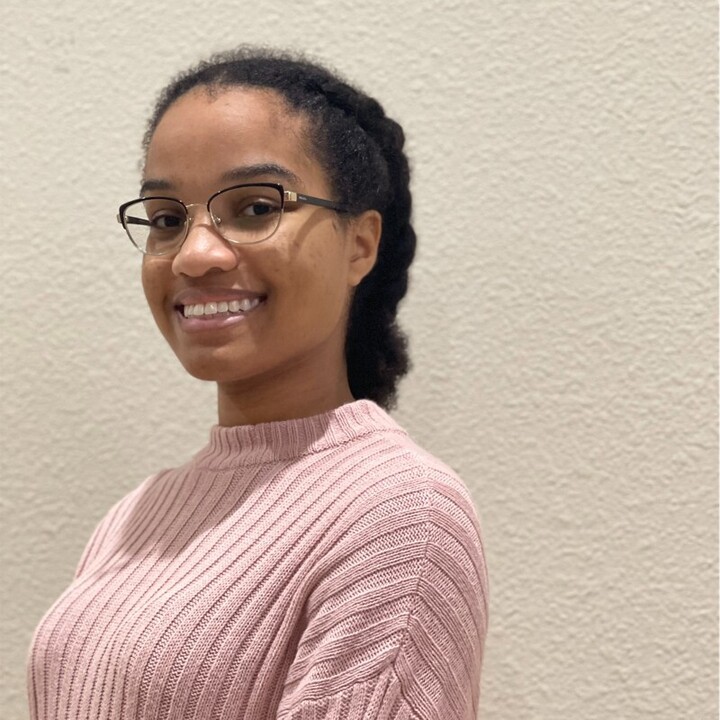Through UROP, MIT Student Kezia Hector Focuses Research to Explore Data & Hurricane Intensity
April 26, 2023
Photo courtesy of NASA.
MIT student Kezia Hector, who is majoring in Chemical Engineering, has been working with the MCSC through the Undergraduate Research Opportunities Program for several semesters. Kezia has been working with Sydney Sroka, MCSC Impact Fellow, to determine hurricane intensity using reanalysis data and machine learning. She had the opportunity to present at the American Meteorological Society (AMS) Conference to share this work. We caught up with Kezia to discuss her MCSC experience and how it has impacted her personal and professional goals.
How did you first get interested in this work, and how have your interests evolved over your time?
I have always had some interest in sustainability and environmental sciences, so when I heard of an opportunity to work with the MCSC in my sophomore year, I thought it would be a good way to delve more into the field. As I have worked at the MCSC, I believe my interests have become more focused. Before coming to work in the MCSC, I was not entirely sure in which direction I wanted to take my degree. Chemical Engineering is a rather versatile field, so there is no shortage of options in terms of my career. I had had a few different very vague ideas of what I may be interested in using my degree for, but I had never fully fleshed any idea out. After having worked at the MCSC for some time, I have been able to take my light curiosity in the environment and sustainability and hone it into something more concrete, and gain more direction in my plans for my future.
Talk to us a bit about the real-world implications of this work.
This work has the potential to provide some more information on previously unexplored realms of determining hurricane intensity. For example, we spent some time looking into the environmental factors that affect surface exchanges between the air and sea. Specifically, we were looking at surface exchange coefficients, which is the ratio of the drag coefficient to the enthalpy transfer coefficient. These exchange coefficients in addition to their impacts on hurricane intensity, are typically not very complex in hurricane models. So, the possible effects of factors such as intensity on these exchange coefficients and vice versa, have not been significantly considered.
Our work is meant to show if the data can fill in these knowledge gaps and determine if exchange coefficients are another element that we could leverage to create more accurate models. Especially as it pertains to storms that experience rapid intensification. Our hope, as we move forward, is to see if we can determine if any factors are correlated with intensification according to the data. And, if we are able to find those correlations in the data, we could then use them to create more accurate models capable of predicting if a hurricane will rapidly intensify.

"As I have worked at the MCSC, I believe my interests have become more focused."
What was that experience like at the American Meteorological Society (AMS) Conference, presenting your work for a larger audience?
Presenting for a larger audience was definitely a bit nerve-wracking. I have had plenty of experience presenting in the MCSC and in classes, but never had to present on a level of this magnitude before. I was a bit intimidated at first, but as the conversations and presentations continued, I was able to gather my bearings fairly quickly. It was also a wonderful learning experience as I gained some insights from hearing other people’s commentary on my poster as well as through the conversations I had with anyone who came to hear me present. I loved seeing so many people take an interest in my work, and ask me questions about where the work could go and what we could do with it.
Tell us about your professional goals.
I hope to continue working in environmental/sustainable fields in the future. I plan to go on to get my master’s in some form of environmental science/or engineering field. From there I plan on going into industry. I haven’t decided if I would prefer working for a larger, more established company or go into start-ups as I also have a large interest in entrepreneurship, but for now, I have settled on environmental and sustainable fields.
What is something you’ve learned or experienced at the MCSC that you are excited to apply to your future work or studies?
One skill I have really gotten to work on in the MCSC is expanding upon ideas, and developing them further to create new insights. I think being able to take the original task and idea and use it as fuel to come up with new ideas or ways we can explore the data is a good skill to have, especially in research. The first approach may not always be the best one, or you may be able to see new connections by using another approach or idea, and being able to recognize and determine what may be a useful thing to look into is incredibly helpful for reaching new conclusions.
